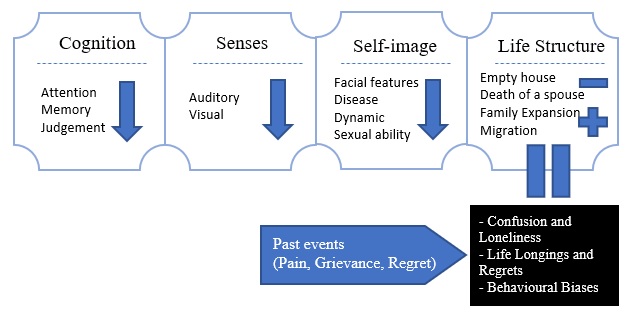 Topic: Seniors and Mental Health: Depression and Anxiety
Topic: Seniors and Mental Health: Depression and AnxietyDate/Time: 23 August 2022 (Tuesday), 9.30am-10.30am
Speaker: Ms Lee Li Li (Consultant Psychologist and PhD candidate in Gerontology Medical Science)
According to the World Health Organization (WHO), dementia and depression (or depressive symptoms) are the most common mental disorders among older people, followed by anxiety and other mental illnesses.
Depressive symptoms in old age (60 years old+)
- The onset of depression in old ages
- Recurrent depression that has been recovered (relapse in old age after 3 years of recovery)
- Environmental factors > Genetic factors
Is there any difference between depression in older people and depression in people of other age groups?
| Other Age Groups | Old Age | |
| Emotion/Feelings | Irritable; Sorrow; Despair; Empty | + More physical issues (headache, backache, etc.) |
| Psychological Motivation | Lost interest in the things you liked | + Decreased motivation (Example: get distracted in doing things) |
| Physiological | *Changes in appetite/weight; *Changes in sleep; *Change in physical strength |
+ Excretion (too much/too little), dyspnea |
| Cognitive | Low self-esteem; Negative mindset; *Self-harm; Contemplating death |
+ Willingness to commit suicide = 2 times |
| Behaviour | *Being distracted; *Mental slack or excited | + Nervous, anxious |
• It is often ignored by the physician

The decline in cognitive ability, senses, self-image, life structure, and other factors are the main causes of geriatric depression. Furthermore, some older adults were observed to enjoy watching certain TV series, suggesting that they project their past experiences (pain, sorrow, regret, etc.) onto the show. At this point, we should pay closer attention to whether they appear lost, lonely, absent-minded, regretful, behavioural biases, etc.
Patient Health Questionnaire-9 (based on the past 2 weeks)
Scoring: 0 None at all; 1 some day; 2 more than half of the days; 3 almost everyday
1. Little interest or pleasure in doing things
2. Feeling down, depressed or hopeless
3. Difficulty in falling asleep, staying asleep or sleeping too much)
4. Feeling exhausted.
5. Lack of appetite or overeating
6. Disapprove of yourself (e.g. feeling bad about yourself, have let yourself or your family down)
7. Trouble concentrating on things, such as reading the newspaper or watching TV
8. Moving or speaking slowly that other people could have noticed/Being restless or fidgeting a lot more than usual
9. Suicidal thoughts, harming yourself in some ways)
(Note: This test is for reference only and should not be used for self-diagnosis or self-treatment.)
When a close friend or family member is depressed
- Understand the signs and symptoms of depression
- Avoid using not-suitable words as below:
- “Only you can help yourself” (to avoid feelings of remorse or being pushed away)
- “Keep calm and don't think of it” (may replace this sentence with soothing methods, such as breathing exercises)
- “You are so lucky, why are you depressed?” (avoid commenting on their emotions, either negative or positive)
- “Cheer up” (be strong), “don't be a coward” (elder people are not suitable for being provoked)
- “You should find your own way to build resilience” (avoid using "You should...", elder people will be stressed)
- “This is your excuse for avoiding chores and work” (avoid blame or criticism)
Notes: The above content was transcribed from our August 23th, 2022 Unilifesity’s Elderly Enrichment Programme - Seniors and Mental Health: Depression and Anxiety. Please kindly contact our office if you would like to learn more or seek consultation. Thank you.





